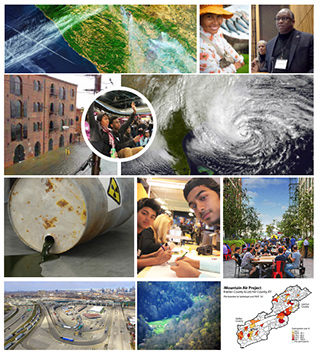Table of Contents
Program Description

Research to Action (R2A) encourages multidisciplinary projects to investigate the potential health risks of environmental exposures of concern to a community and to implement an environmental public health action plan based on research findings. Projects employ community-engaged research methods to conduct research and to seamlessly translate research findings into public health action. The R2A program is part of the NIEHS Partnerships for Environmental Public Health (PEPH) Network.
R2A projects include at least one researcher in environmental health sciences and at least one member of a community-based organization (CBO) who works directly and regularly with the affected community. Through equitable partnerships and drawing upon the unique strengths of each partner, the funded projects conduct collaborative research and translate research into public health action.
Community involvement in environmental or occupational health research ensures that:
- Communities play a role in identifying and defining problems and risks related to environmental or occupational exposures and stressors that are of greatest importance to them.
- Communities receive scientific and financial support to conduct high quality research in partnership with scientists and/or public health professionals. Projects include efforts to characterize distributions and sources of environmental and occupational exposures, and distributions of exposure-related diseases in their community. These activities empower all involved to take actions to reduce potential health risks.
- Community members actively participate with researchers and public health professionals to develop effective strategies for education, outreach, and remediation in response to environmental or occupational threats. They also develop ways to prevent such exposures and health outcomes in the future.
Program Highlights
Research to Action grantees develop education, outreach, and intervention programs to improve understanding of the problem. Some projects promote actions to prevent or reduce harmful environmental or occupational exposures.
Grantees are encouraged to evaluate scientific and community-engaged activities relevant to their project's goals and objectives. Below are a few examples of projects funded under this program.
Prevention of Paralytic Shellfish Poisoning in Alaska
Paralytic shellfish poisoning (PSP) from eating shellfish is a serious illness that disproportionately affects Alaska Native communities. Matthew Gribble, Ph.D., of Emory University is working with the Sitka Tribe of Alaska and Southeast Alaska Tribal Ocean Research organization to improve monitoring and develop cutting-edge modeling methods to predict risky shellfish harvest times and prevent poisonings. The long-term goal is to reduce the burden of PSP disease in Alaska.
Laurel Schaider, Ph.D., of the Silent Spring Institute is leading a partnership to address the effects of per- and polyfluoroalkyl substance (PFAS) contamination in drinking water. They are partnering with two communities to study immune system effects in young children. The team has built a novel online resource center called PFAS Exchange to engage and inform communities, and study impacts of PFAS exposure at the individual, family, and community levels.
Imperial County Community Air Monitoring Project
Paul English, Ph.D., of Tracking California, is teaming with Luis Olmedo of Comité Cívico del Valle, Inc., to collaborate on a project related to air monitoring in Imperial County, California, where particulate matter pollution often exceeds the California health safety standard. With community involvement, they created a network of air monitors called Identifying Violations Affecting Neighborhoods (IVAN). Community members have been helping select locations of air quality monitors, create outreach materials, disseminate information, and share data to inform health-protective decision making.
Sherry Baron, M.D., is co-leading a project with Homero Harari, Sc.D., in collaboration with the community-based organization, Make the Road New York (MRNY), to learn about domestic cleaning worker exposures to cleaning products in New York City. Jamie San Andres is the project coordinator at MRNY. The team is developing exposure measure methodology, using citizen science approaches, and engaging and educating workers to help them understand how to reduce harmful exposures. Their project uses smart phone applications as tools to document workplace conditions.
Reducing Respiratory Disease in Appalachia
This project is a collaboration between scientists at the University of Kentucky and several community partners in the Appalachian region whose goal is to reduce respiratory health disparities in Appalachian communities. UK researchers Steven Browning, Ph.D., and Nancy Schoenberg, Ph.D., are leading the collaboration. The team will conduct a community-based assessment to better understand the environmental, social, and behavioral factors that contribute to the high occurrence of asthma and chronic obstructive pulmonary disease. They also plan to develop a culturally appropriate environmental public health action strategy.
R2A Grantees Share Their Work
R2A grantees create and share resources with stakeholders including community members, public health workers, and decision makers. Some examples of their work include:
- Assessing and Addressing Exposures to Soil Contaminants Related to Urban Gardening - Healthy Soils Healthy Communities – Murray McBride and Henry Spliethoff (Cornell University)
- Community Action to Promote Healthy Environments - Public Health Action Plan – Amy Schulz and Kristina Rice (University of Michigan)
- Guidebook for Developing a Community Air Monitoring Network (Public Health Institute) – Paul English and Catalina Garzon (Public Health Institute)
R2A Project Locations

Additional Resources
Program Contacts



